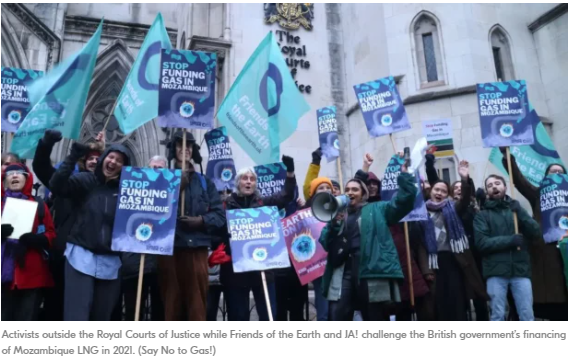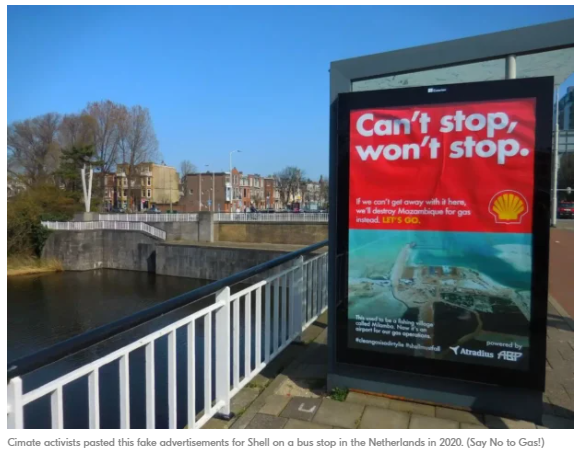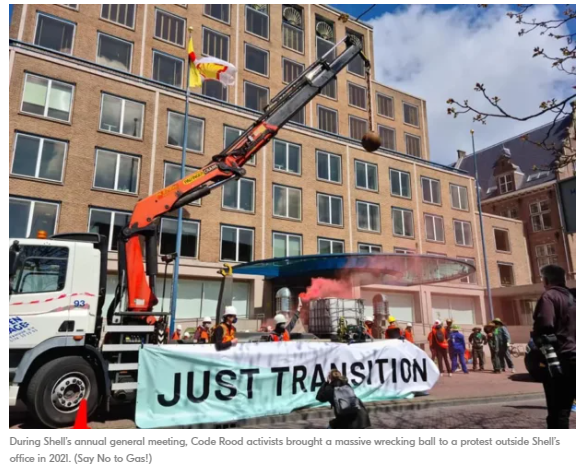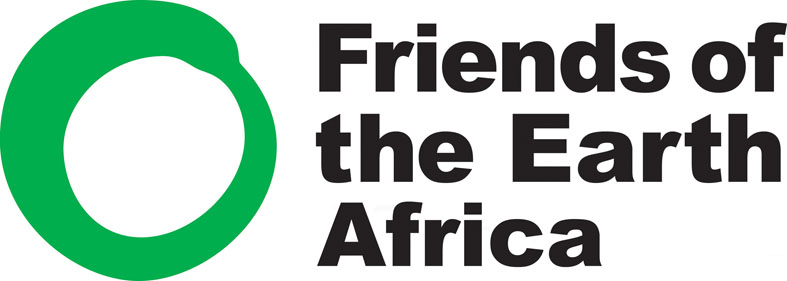Mozambican communities and their allies are fighting to stop the multinational gas giants and financiers behind LNG projects that will cost $50 billion.

In Mozambique’s northernmost province of Cabo Delgado, multinational giants TotalEnergies, ExxonMobil, Eni and others are developing three liquid natural gas, or LNG, projects. They will cost $50 billion, making them the largest LNG projects in Africa. Only one of these projects has started gas extraction, and already the industry has brought devastating consequences for communities, the land and climate — and has pushed the poor country further into debt.
However, the industry has a thorn in its side: the international Say No to Gas! campaign, which won’t let it get away with its actions without a fight.
The campaign is led by Friends of the Earth Mozambique, known locally as Justiça Ambiental, or JA!. For six years, until last July, I worked for JA! coordinating the international work of the campaign. My ultimate role was to make sure that the experiences of people on the ground reached an international level and platform.
As JA! Director Anabela Lemos recently explained, “The communities we work with have been suffering at the hands of TotalEnergies and companies that have taken everything from them, but they have remained resilient. Journalists and activists we know have disappeared, fishing and farming communities have lost everything. The industry is not bringing any of the ‘development’ they promised, but just pushing already poor people further into poverty.”
JA! works directly with community members in the gas region who are putting their lives on the line. At the same time, it is up to the international partners, who lobby against industry players in the countries where they are based, to amplify the voices of those people suffering on the international stage.
These are voices of people who have been displaced by TotalEnergies to build their Afungi LNG Park that will hold support facilities for offshore gas extraction. At least 550 fishing and farming families were displaced to a village many miles from the sea. They have lost their farmland, and hence their entire livelihoods, and are now living off erratic aid.
The industry has been fueling a war that has been raging for six years, and has already displaced over one million people. This war between insurgents, private security and the militaries of Mozambique, Rwanda and other countries only began when the gas companies became present in the area.
Media and civil society are oppressed in the country, and many who speak out face legal repercussions or worse. One activist that JA! worked with disappeared after raising their voice at a community meeting, and several journalists have been missing for years. This makes resistance inside the country very difficult, and just speaking truth to power or writing an article raising problems with the gas industry is a revolutionary act.
People have lived in fear of both insurgents and the military, who have often extorted families for their compensation money. Many women in communities have faced or been threatened with sexual assault.
At an environmental level, the industry will irreversibly destroy the Quirimbas Archipelago, a UNESCO Biosphere, home to many endangered species of animals and plants. And the carbon emissions for just the construction of one LNG train in the park will increase the greenhouse gas emissions of Mozambique by up to 14 percent.
International pressure builds despite challenges
There are several ways in which international partners amplify the voices of these Mozambican communities.
One approach is through what the campaign calls “industry confrontation.”
Partners from Europe and the U.S. — and where possible, JA! members — attend shareholder meetings to disrupt them, hold actions and publicly ask difficult questions.
In 2021, Friends of the Earth France helped to shut down the TotalEnergies shareholder meeting in Paris by blocking the entrance and forcing the company to move the meeting online. Meanwhile, at COP26, activists disrupted an Eni event by standing up and playing a voice recording of a Mozambican activist.
The campaign has also worked with other campaigns like Shell Must Fall!, Don’t Gas Africa and Collapse Total, which also fight the East Africa Crude Oil Pipeline, and the Fair Finance Southern Africa Coalition.
Partners in different countries use different strategies depending on the specific involvement of that country, each adding a different element to the campaign.
For example, in the U.S., where government agencies like the U.S. Export–Import Bank are also funding Mozambique LNG, with $4.7 billion in public funds, Friends of the Earth U.S. has been filing complaints with the bank’s accountability mechanism. Other international funders like the U.S. Development Finance Corporation, African Development Bank and Japanese government financiers have also been targets of complaints.
“The U.S. is an international leader whether we like it or not,” said Kate de Angelis from Friends of the Earth U.S. “So if we are able to convince the U.S. to stop overseas finance for fossil fuels, it makes it much more likely that Japan and other countries will follow.”

Friends of the Earth England, Wales and Northern Ireland took the U.K. government to court in 2020 for a judicial review of its financing of the Mozambique LNG project with $1.15 billion.
Even though the Supreme Court rejected the legal challenge, “the case has been highly significant,” said Rachel Kennerley from Friends of the Earth England, Wales and Northern Ireland. “It posed critical questions for the government over its responsibility to now act in accordance with the Paris Agreement and increased the legal risk around projects like Mozambique LNG.”
Knowledge creation is another important part of the campaign.
Previously, JA! and its partners created a report about funding for Mozambique gas from Export Credit Agencies, which are government agencies that use public money to finance projects abroad. And this month saw the release of a Solutions for our Climate report about Korea’s role in Mozambique LNG, along with a Columbia University report commissioned by JA! and a number of campaign partners on Investor State Dispute Settlements. JA! also published a joint report with the Fair Finance Coalition about South African government financing of Mozambique gas.
In the near future, JA! will be releasing a report with novel research on the complicity of consulting firms in the devastation caused by Mozambique gas.

The campaign has also undertaken creative methods of resistance. In 2020, in collaboration with climate activists from around the world, they did a series of “adhacks” in Portugal, France and the Netherlands, where they pasted fake advertisements for Shell and Portuguese fossil fuel company Galp, on bus stops around the cities. Similarly, in London during the same year, the campaign collaborated with Platform London to paste images on billboards against HSBC, one of the biggest financiers of Mozambique gas.
In 2021, during COP26, activists projected messages on the outside of the SEC building in Glasgow where the meeting was being held. The next year, at a Shell annual general meeting in the Hague, activists placed a wrecking ball outside of the building; and in Denmark, protesters blocked Total petrol stations for several days. The campaign has also produced comic books, short films and music videos.
But with a campaign fighting a major industry, challenges will naturally arise.
“The difficulty is that we are not just fighting fossil fuel companies, we are fighting an entire global system where wealthy capitalists, mostly from the Global North, exploit the poor for fossil fuels which are destroying the climate,” Lemos said.
De Angelis says that there are challenges specific to different governments. In the U.S. for example, “The impacts on local communities and local environment are often very quick to be dismissed or completely ignored no matter what the evidence,” she said. “Japan has also been a major hindrance as it has a very conservative government that has refused to stop supporting fossil fuels and is openly hostile to impacted communities.”
Another challenge is the danger and difficulty of field work for JA!.
The war has meant that for most of the last five years the gas region has been closed to non-residents, journalists and most NGOs unless they received government permission and were chaperoned by the military.
JA! has an employee based in a community in this region, who works directly with people who live there. But they have been terrified to speak out about their suffering, for fear of reprisal from the government or the military.
‘A lot has changed’
But the campaign has seen the impact of its work along the way. In one community in Cabo Delgado, when women’s presence was required for legitimacy of the industry’s so-called consultation meetings, women refused to attend. In the Netherlands, the Ministry of Finance held an independent evaluation of the government’s financing agreement with the Mozambique LNG project of $800 million, following the campaign’s lobbying. This brought major public and parliamentary attention to the usage of public funds for a destructive project.
Affected community members, while devastated, have felt supported by the campaign. “For us, since JA! started working here in Palma, a lot has changed,” Arabe Nchamo said. “We complained to the white people about not having transport to the beach, and after JA! talked to them, we have transport, tricycles and bicycles. We are grateful. We complained about the new farmland being far away, and JA! worked hard until we managed to get the company to give us transport from the farms to the houses.”

Lemos says that the campaign’s plans now are to continue its work as a watchdog in the gas region, monitoring and publicizing human rights and environmental violations and amplifying voices of affected communities at international platforms. This is done, for example, through meetings with the European Union, United Nations officials, shareholder meetings, in-person meetings with financiers and relevant states, and continuing in-depth research. It will also emphasize the fact that these fossil fuel companies’ actions in Mozambique show how blatantly they are moving away from any chance of a just transition to renewable energy.
TotalEnergies’ Mozambique LNG Project has been on pause since 2021, after a major insurgent attack in the region. But the construction of its park may restart very soon. This has created a window of opportunity for financiers to reassess their funding of the project. And the campaign is putting serious pressure on these players, reminding them that were they to finance this destructive project, they would be complicit in its impacts.
“The Mozambique LNG project is a good example of the colonial nature of a lot of fossil fuel investments,” Kennerley said. “Stopping Mozambique LNG and the gas industry across the country is extremely important because Mozambique is already on the front line of the climate crisis. Its people are already vulnerable to extreme weather and aren’t being served by the current energy system, which has not delivered energy access.”
First published by – https://wagingnonviolence.org
For more details reach Anabela Lemos / JA!

